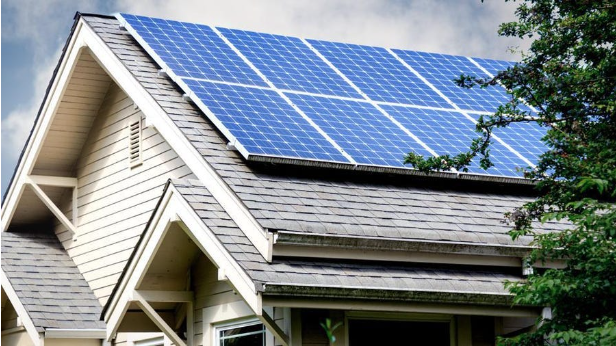The biggest commonality between leasing and buying solar panels is that the homeowner can experience utility savings while reducing their impact on the environment. No matter which type of solar panel you’re thinking about, leasing vs. owning is still a valid concern.
Key Differences
Leasing Solar Panels
Leasing solar panels makes the switch to solar energy more attainable for customers who may not have the cash reserves required for the upfront investment in solar panels. However, unlike buying solar panels, or using a payment plan toward the purchase of solar panels, leasing solar panels means you do not own them. Rather, a third party owns the equipment.
Buying Solar Panels
When you buy solar panels, there may or may not be a payment plan available. There are often additional credits available to people who purchase solar panels based on the state or the manufacturer’s reimbursements. Still, there is bound to be an upfront investment when you purchase solar panels. It’s always best to check with your chosen solar companies or installer for quotes.
Leasing Solar Panels Cost
On average, leasing solar panels will cost between $50 and $250 per month. This cost is determined by multiple factors, i.e., how much energy you use, the company, your location and your credit score. Plus, some solar companies require a down payment, while others allow you to lease with a $0-down agreement. These costs should be considered when determining if you should lease a solar panel system.
Which Payment Option Is Best?
There are a few ways to look at the payment options available for buying or leasing solar panels. In considering these options, the biggest factor may be how long you plan to stay in the home and what money you have available to invest in the solar panels.
If you have available funds, then buying solar panels is ultimately the savvier financial decision. That’s because, although solar panels cost an average of $18,000 to install, the average amount of time it takes to get a full return on the investment due to energy savings is between seven and 10 years. You can also benefit from federal tax credits and reimbursements when you own the system
On the other hand, you may be able to begin leasing solar panels for little to no money down. Although you don’t qualify for tax credits or reimbursements, this is an attractive way to quickly start saving money on utility bills and help the environment—even if you aren’t able to independently invest in the solar panels.
On average, solar loans last about 20 years, although some are available for short periods of time. Considering the average payback period for people who own solar panels is seven to 10 years, owning is ultimately the better way to save money.
Ways to Pay for Solar Panels
Cash
Paying for solar panels with cash is an upfront expense, however it is ultimately the lowest cost way to purchase and benefit from solar panels. That’s because when you pay for solar panels with cash, you will not accrue interest on the payments.
Instead, from the moment you purchase the solar panels, you can begin “paying them back” by saving money on monthly utility bills. Without hidden fees or fine print, you can have full knowledge over how much the solar panels cost.
Home Equity Loan
If you want to finance the purchase of solar panels, a home equity loan may be a good way to get a low interest rate. Also known as a HELOC, you first need to have equity in your home. Then, you will work with a lender to work out the terms and conditions. Once you are approved for a HELOC, you can purchase the solar panels upfront and then pay the HELOC back through the lender or the third party to whom they’ve sold the loan.
Solar Loan
With a solar loan, you can still be eligible for rebates and incentives associated with purchasing solar panels—while spacing out the payments through the terms of the loan. As with any loan, you will be charged interest over the course of the loan term.
That means you will ultimately end up spending more than the upfront cash rate for the solar panel. The difference between getting a solar loan and using a solar lease is that, with a loan, you own the system. If you are interested in a solar loan, you will need to shop around for the best rates and terms.
What You Can Lose by Leasing
Ineligible for Rebates and Incentives
With a solar lease, you do not own the system and therefore do not qualify for government or private rebates or incentives for the solar panels. Depending on where you live, the cash-based incentives may be significant enough to make purchasing solar panels a much better option.
The Home Can Be Hard to Sell
Although solar panels in general add value to a home, a home with leased solar panels can complicate a real estate transaction. If the panels cannot be moved, or the lease cannot be transferred to the new owner (either because they are disinterested or the lease originator will not agree), then you may have to pay more to break the contract.
What You Can Gain by Leasing
Little to No Upfront Costs
Depending on the terms of the solar lease, you may be able to get solar panels up and running on your home for little to no money down. Although you will continue to make payments throughout the term of the lease, you will also save money through your utility bill.
Avoid Maintenance Costs and Efforts
Solar panels are relatively low-maintenance—however they are not entirely maintenance-free. That is unless you have a solar lease. With a lease, any problems with the solar panels should be covered by the third-party owner. All that leaves to you is occasionally brushing debris off the panels.
What You Can Lose by Buying
The Investment is Steep
Whether you use cash or a private loan for solar panels, the amount you have to pay to own solar panels is not insignificant. If you do not have the available funds for a cash purchase, then you will pay more over the life of a loan in interest.
Questionable Return on Investment if You Move
Although solar panels can get a good return on investment if you plan to stay in the home long-term, the payback may not be quite as good if you sell to another homeowner who doesn’t see the value in solar panels. If you opt to move your solar panels, the average cost is $4,000 to $8,000.
What You Can Gain By Buying
Eligible for Rebates and Incentives
As the owner of the solar panels, you can qualify for government and private cash incentives. These can dramatically reduce the cost of the solar panels while giving you full ownership of the system.
Long-Term Savings
Whether you buy or lease solar panels, you will be able to save money with monthly utility bills. The difference is that you have to pay to lease solar panels for as long as the lease lasts—whereas you may not have payments when you own the solar panels and can just enjoy the monthly savings. If you plan to use solar panels for decades to come, this makes purchasing the much better option.
Tax Credits And Incentives
Federal Solar Tax Credit
Based on the Investment Tax Credit, also known as the federal solar tax credit, you can deduct 26% of the cost of installing solar panels on your home from your federal taxes if you own the system. This credit is guaranteed through 2022.
State Tax Credits
Depending on your state, you may or may not be eligible for a tax credit for the purchase of solar panels. Because cash incentives are one of the biggest benefits of purchasing solar panels, then leasing may have an advantage if your state does not offer a tax credit.
Buying Is Best if
You Have the Money
Although the upfront investment associated with buying solar panels is no small matter, the panels will eventually “pay for themselves”—generally in less than 10 years. After that, the energy savings can continue.
Leasing Is Best if
You Want to Get Started With Solar
When you lease solar panels, you get the benefits of reducing your utility bills and helping the environment without dramatically affecting your savings at one time. Depending on the lease program and terms, you may be able to buy the solar panels at the end of the agreement.
Bottom Line
Owning or leasing solar panels both allow homeowners to enjoy utility bill savings while helping the environment. Leasing is better if you want to get started with solar without a large initial investment while owning is the best way to save money long-term.


